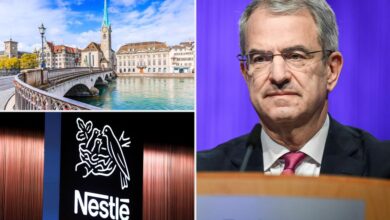Trump cuts tariffs on Japanese cars after in trade deal with Tokyo

President Trump slashed tariffs on Japanese cars Thursday in a sweeping trade deal that opens Tokyo’s markets to US rice and farm goods while pledging hundreds of billions in new Japanese investment on American soil.
The executive order cuts levies on Japanese auto imports from 27.5% to 15%, easing pressure on motor giants Toyota, Honda and Nissan and formalizing an agreement first unveiled in July.
The White House said the deal also compels Tokyo to pour $550 billion into US projects while pledging to buy at least $8 billion worth of American goods every year.
“This is a massive agreement — a great deal for everybody,” Trump boasted when the pact was first announced.
“I always say it has to be great for everybody. It’s a great deal.”
The order caps months of tense negotiations that began after Trump slapped sweeping tariffs on countries worldwide in April, rattling allies and adversaries alike.
“Finally,” Japan’s top trade negotiator, Ryosei Akazawa, wrote in Japanese as he reposted the White House announcement on social media.
According to the order, the pact is designed to cut America’s stubborn trade deficit with Japan while giving US businesses “breakthrough openings” in tightly protected sectors.
Tokyo agreed to gradually expand access to its agriculture market, including a 75% increase in purchases of US-grown rice — a concession long resisted by Japanese farmers.
In addition to rice, Japan will step up imports of US agricultural products, fertilizers and bioethanol, the White House said.
The deal is a lifeline to American farmers hit hard by Trump’s earlier tariff fights with China and the European Union. By locking in Japanese demand, the administration hopes to calm rural voters heading into the thick of the election cycle.
For Japan, the compromise buys relief for its auto sector, which is the backbone of its export economy and directly targeted by Trump’s America First trade crusade.
Cars account for roughly 20% of Japan’s total exports, and the US is its single biggest market. Toyota alone warned last month that American tariffs could cost it about $10 billion this year.
Japanese automaker stocks jumped in Tokyo on Friday as investors cheered the cut in US tariffs. Parts suppliers also rallied on hopes of renewed demand.
The agreement also signals a thaw after months of friction. Trump’s blanket tariffs jolted global markets when they took effect in August, forcing governments and multinationals to scramble.
Tokyo had balked at Washington’s hard line, insisting its farmers could not withstand a flood of US rice and meat. Japanese leaders also feared ceding too much to an unpredictable Trump, who has previously blasted the country for “taking advantage” of US security guarantees.
But faced with mounting trade losses and the specter of a full-blown clash with its largest buyer, Japan blinked.
Trump crowed that the concessions prove his tariff gambit is working.
“We’ve rebalanced global trade,” he said at the signing. “It’s America First, but it’s also fair for everyone.”
Critics countered that slapping duties on allies to force bilateral deals risks destabilizing the global trading system.
Economists have warned the president’s approach could boomerang on US consumers through higher prices and restricted choice.
Japanese leaders framed the outcome more cautiously, with negotiator Akazawa praising the compromise but avoiding the triumphalism heard in Washington.
For Tokyo, the biggest win may be simply avoiding the chaos of an escalating trade war.
Analysts say the real test will be whether Japan follows through on its pledges to boost US imports, especially rice. Previous promises to open its agricultural sector have faced fierce pushback from rural voters and entrenched lobby groups.
Even with concessions, the Japanese economy remains highly export-dependent. Any slowdown in US demand for cars and electronics could rattle growth in Tokyo.
Meanwhile, Trump’s aggressive tariff diplomacy continues to ripple worldwide. Governments from Brussels to Beijing are recalibrating trade strategy to avoid clashes with Washington.
The Post has sought comment from the White House, Toyota, Honda, Nissan and the Japanese government.
Credit to Nypost AND Peoples



